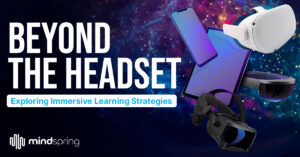
Artificial intelligence (AI) has become a pivotal tool, offering unprecedented opportunities to enhance the effectiveness and personalization of learning experiences. However, as organizations increasingly incorporate AI into their learning strategies, addressing the ethical considerations and privacy implications that accompany these technologies is crucial. This article explores the key concerns and provides guidance for companies looking to responsibly integrate AI into their learning ecosystems.
Understanding AI in Corporate Learning
In corporate learning environments, the application of AI, particularly Generative AI, is reshaping how content is created and delivered. Generative AI refers to algorithms capable of producing text, images, and interactive materials based on vast amounts of training data. These capabilities are being harnessed to create dynamic, tailored learning experiences that respond in real-time to the learner’s needs.
Generative AI for Content Creation
Generative AI systems can automatically generate learning content that is both customized and scalable. For example, these systems can produce written content, simulate realistic scenarios, or create interactive lessons that are specifically designed to match the skill level and learning pace of each employee. This enhances the learner’s engagement and improves knowledge retention by aligning with their personal learning styles and professional goals.
Real-Time Generative AI in Learning
More advanced applications of Generative AI involve real-time interaction with learners. These AI systems can adapt to a learner’s responses during a training session, offering personalized guidance, adjusting difficulty levels, or providing additional resources tailored to immediate needs. This type of AI can simulate one-on-one tutoring, offering direct feedback and support that is akin to personal coaching, which is particularly valuable in complex skill areas or when addressing specific weaknesses.
The integration of Generative AI into corporate learning platforms also supports just-in-time learning — the ability to provide necessary knowledge at the precise moment it is needed, thus enhancing decision-making and performance on the job. This is particularly effective in rapidly changing industries where staying up-to-date with the latest trends and technologies is crucial.
Machine Learning and Data Analytics
Advanced AI applications in learning involve the use of machine learning models and algorithms to analyze learning patterns, predict learning outcomes, and tailor content to individual needs. Such systems can significantly improve engagement and efficacy by providing learners with personalized recommendations, adaptive learning paths, and automated support. However, the data used to fuel these AI systems—often including personal information about learners’ performance, preferences, and behavior—raises significant privacy and ethical issues.
The Privacy Challenge
The primary privacy concern in AI-enabled learning is the extensive collection and processing of personal data. AI systems require vast amounts of data to function effectively, including sensitive information such as employees’ learning progress, assessment results, and even biometric data in some advanced systems. Ensuring the protection of this data is critical, as mishandling can lead to breaches that compromise employee privacy and trust.
Organizations must also comply with relevant data protection laws, such as the General Data Protection Regulation (GDPR) in Europe or the California Consumer Privacy Act (CCPA) in the United States. These regulations mandate strict measures around data collection, processing, and storage, emphasizing the need for transparency and user consent. Compliance with these laws not only helps protect personal information but also shapes how AI can be ethically utilized, ensuring that its deployment enhances learning without compromising data integrity or employee trust.
Ethical Considerations
Beyond privacy, there are several ethical concerns related to the deployment of AI in learning and development:
- Bias and fairness: AI models can inadvertently perpetuate existing biases if they are trained on skewed or unrepresentative data. This can lead to unfair treatment of certain groups, affecting their learning opportunities and career progression.
- Transparency and explainability: AI algorithms can be complex and opaque, making it difficult for users to understand how decisions are made. This lack of transparency can affect accountability and trust, particularly when AI-driven decisions impact career opportunities.
- Employee autonomy: The use of AI to monitor and guide learning can sometimes be perceived as intrusive or controlling. Balancing personalized learning benefits with respect for individual autonomy and consent is essential.
Best Practices for Ethical AI in Learning
To address these concerns, organizations should adopt a set of best practices that prioritize ethics and privacy:
- Data minimization: Collect only the data that is necessary for the specific learning objectives and ensure it is used solely for that purpose.
- Bias mitigation: Regularly audit and update AI models to identify and reduce biases. This includes diversifying training data and involving diverse teams in developing and deploying AI systems.
- Transparency and explainability: Implement mechanisms to make AI decisions more transparent and understandable. This involves using explainable AI technologies and providing clear explanations to learners about how their data is used.
- Secure data practices: Adopt robust data security measures to protect sensitive information from unauthorized access and breaches. These measures include encryption, secure data storage solutions, and regular security audits.
- Stakeholder engagement: Involve all stakeholders, including learners, in designing and implementing AI learning systems. This helps ensure that the systems meet their needs and respect their rights.
Implementing AI Governance
AI governance involves establishing a framework of policies and procedures that guide the ethical development, deployment, and ongoing management of AI technologies. This framework should address key aspects such as the accountability of AI systems, compliance with legal standards, and alignment with ethical principles. Effective AI governance ensures that the use of AI in learning and development not only adheres to regulatory requirements but also aligns with the organization’s core values and ethical commitments.
AI governance helps in creating a structured approach to managing risks associated with AI, such as privacy breaches, unintended bias, and other ethical conflicts. It also emphasizes the importance of continuously monitoring and evaluating AI systems to ensure they remain effective and fair over time. By establishing clear governance, organizations can build more resilient and trustworthy AI systems that learners can depend on for their educational advancement.
As AI continues to transform corporate learning, organizations must remain vigilant about the ethical and privacy challenges that come with these advanced technologies. By embracing responsible practices, companies can leverage AI to enhance learning outcomes while safeguarding employee data and maintaining trust.
If your organization is navigating the complexities of AI in learning, consider reaching out to MindSpring. Our expertise in learning strategy, experiences, and technology can help you understand how AI can fit within your organization, ensuring it is used ethically and effectively. Contact us today to explore how we can support your learning objectives with the power of AI.


